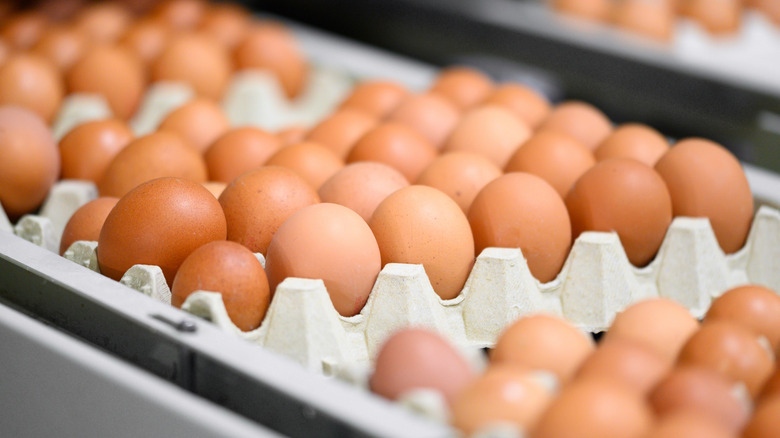Which Fast Food Chains Use Real Eggs?
Most of us flock to fast food chains for a quick bite to eat when quality isn't necessarily a top priority. Still, we have standards, and restaurants using real ingredients like fresh eggs is important. Some fast food establishments rely on "fake" egg products for their menus, but not every brand has given in.
McDonald's, for example, relies on real eggs for all of its meals. The chain cracks a fresh egg for every McMuffin and uses liquid eggs in its other offerings, like the scrambled eggs in its sausage burrito. Wendy's has used freshly cracked grade-A eggs since it launched its breakfast menu in 2020. Whataburger also claims to use farm-fresh eggs. Panera Bread uses real eggs in its breakfast sandwiches, too, and it even petitioned the government in 2018 to encourage other fast food establishments to be transparent about the eggs they use.
Still, some chains use egg products that contain additives, including popular joints like Chick-fil-A, though the chain has pledged to serve 100% cage-free eggs by 2026. Taco Bell, meanwhile, committed to using 100% cage-free eggs at all U.S. restaurants back in 2016, though its cooked liquid eggs do contain some ingredients you wouldn't expect (like the generic descriptor "flavors"). Burger King relies on an egg-based mixture made with xanthan gum and citric acid for its Croissan'wiches, too. Given their ingredient choices, these chains might not make your list of the best fast food breakfast sandwiches.
What's the difference between real and artificial eggs?
More chains than just Chick-fil-A and Burger King rely on enriched eggs. Dunkin' uses an egg product containing ingredients like soybean oil and xanthan gum in its breakfast sandwiches. Starbucks also relies on egg patties containing artificial flavorings and oils for its egg sandwiches. For further information on which chains serve real eggs, you can check out the ingredient lists that are available on most fast food websites. After all, if you frequent one of the chains we mentioned for an egg sandwich, you may be curious about what you've really been eating.
The contents of artificial egg mixtures vary, but they generally contain some part of an egg mixed with added ingredients that help keep the mixture fresh and consistent. These added preservatives could contain more sodium, and some argue that processed eggs lack the same health benefits that real eggs offer.
While using processed eggs means faster production and improved consistency, these chains are sacrificing the opportunity to use wholesome ingredients. What you eat is up to you, but regardless of what you choose, transparency is important.

